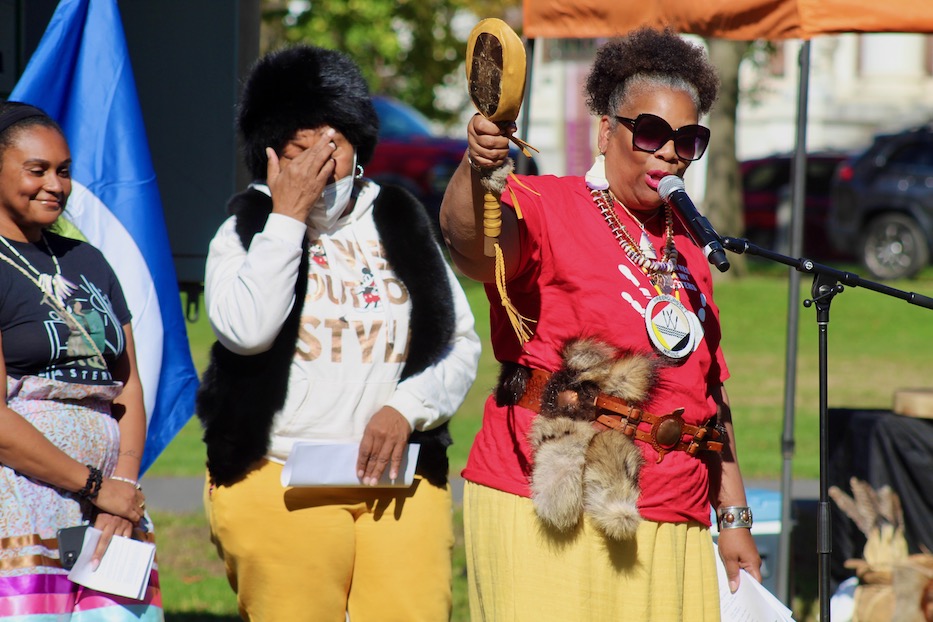
Culture & Community | International Festival of Arts & Ideas | Arts & Culture | New Haven Green | Indigenous rights | Arts & Anti-racism
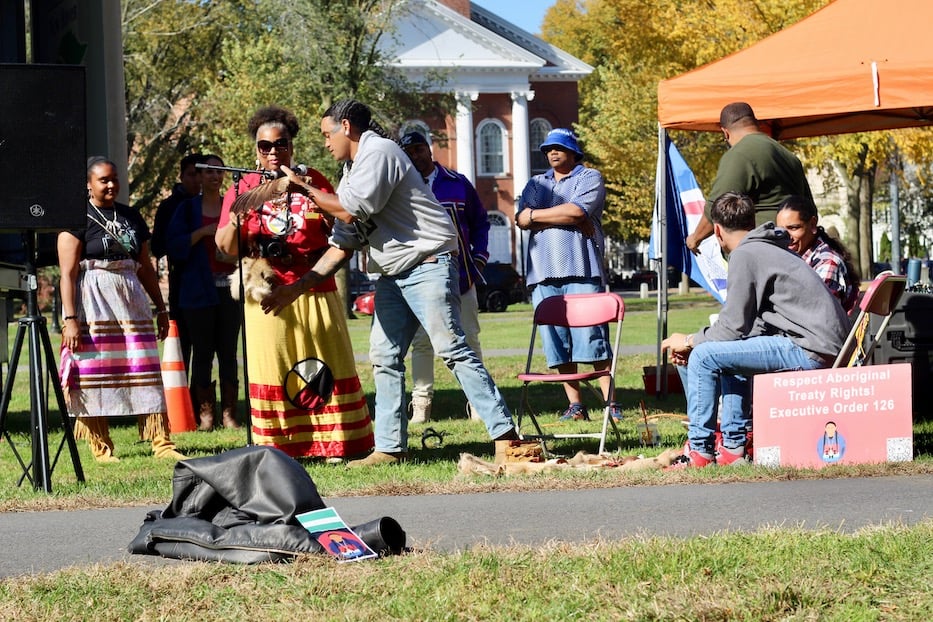
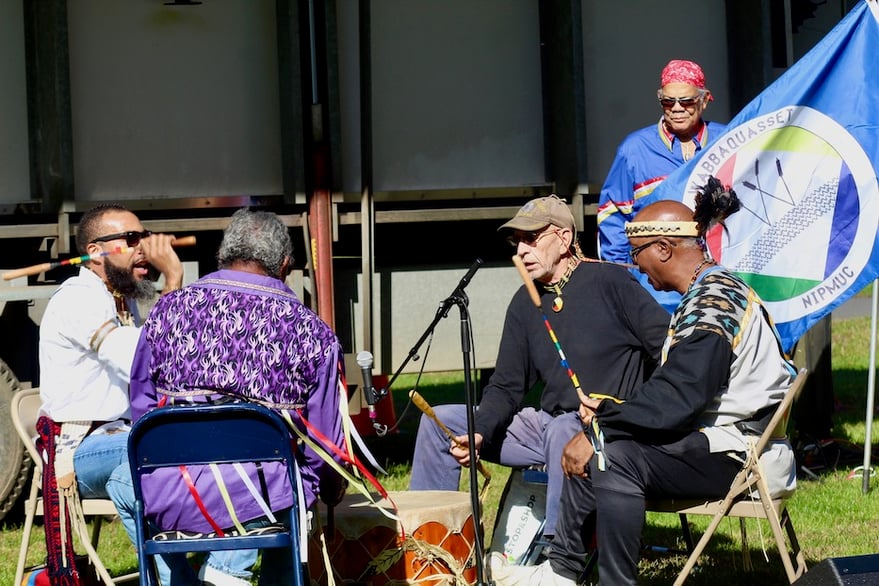
Top: Jennifer Rawlings, Tamiko Jackson-McArthur, and Andre Strongbearheart Gaines, Jr. Bottom: Members of the Pomham Singers, who are part of the Mashapaug Nahaganset Tribe in what is now recognized as Rhode Island. Lucy Gellman Photos.
The clean, bright crack of stick on drum skin reverberated over the New Haven Green, waking the audience into being. On a patch of grass, Raymond Two Hawks Watson closed his eyes, sun warming his face as he ushered in a Shinnecock honor song. Overhead, three dozen pigeons took flight, their gray-blue bodies circling the grass. Just feet away, Dr. Tamiko Jackson-McArthur and Jennifer Rawlings let the sound wash over them.
Thursday afternoon, that sound became a heartbeat of “Honoring Eastern Woodland Culture,” a recognition of the Native people who cared for and lived on and with this land long before it was ever known as New England. A collaboration among the International Festival of Arts & Ideas and Jackson-McArthur, it marked the end of this year’s “Rhythm Exchange” series, which has brought artists and creatives to the Green on a near-weekly basis.
For both the festival and Jackson-McArthur, it marked a momentous first: neither New Haven nor the self-perpetuating, majority-white Proprietors of the New Haven Green have ever formally recognized the space as unceded Quinnipiac territory.
“Today, we honor the Quinnipiac people, the long water people,” said Jackson-McArthur, a lifelong New Havener and pediatrician who is Wabbaquasset Nipmuc, and grew up learning about her own Native history before also learning about the city’s. “We celebrate the ancestors and we thank them.”
“It’s very important to me, and to many Native people, that you see what we look like and you hear our names,” she added. “The Natives don’t look like Tonto or Pocahontas … All too often, folks think that Indians, Natives, will look a certain way. But as you can see, we look all ways. We all look like the diaspora that you see in all demographics.”
From an initial prayer to a culminating round dance, Thursday’s speakers and participants centered both the importance and the vitality of Native culture, which has survived centuries of settler-colonialism, forced displacement, the brutal separation of families and attempted erasure of language, land and customs. In New Haven, where Quinnipiac and Wappinger history is still rarely taught in schools, that sense of urgency struck a chord.
Spreading out in front of an unused stage, members of the Pomham Singers settled into their seats, faces tilted toward the sun, then toward each other, as they listened to remarks. To their left, No Loose Braids founder Andre Strongbearheart Gaines, Jr. and his nephews, Daishuan Tall Hair Red Deer Garate and Miguel Wandering Turtle Garate, took their seats behind a sign offering more information on Massachusetts Executive Order 126. In his hands, Gaines gently held a small drum, waiting as he lowered his head, and listened patiently.
Taking the lone mic, Jackson-McArthur noted how arbitrary and divisive both state and federal recognition of Native tribes—classifications that are often made by non-Native people and use the idea of land ownership, geographical borders and rote categorization—can be. Looking from a sheet of paper in her hands out onto a small audience, she began to read names of tribes that once populated the Eastern Woodlands, and are still a vibrant part of their life and culture, regardless of recognition.
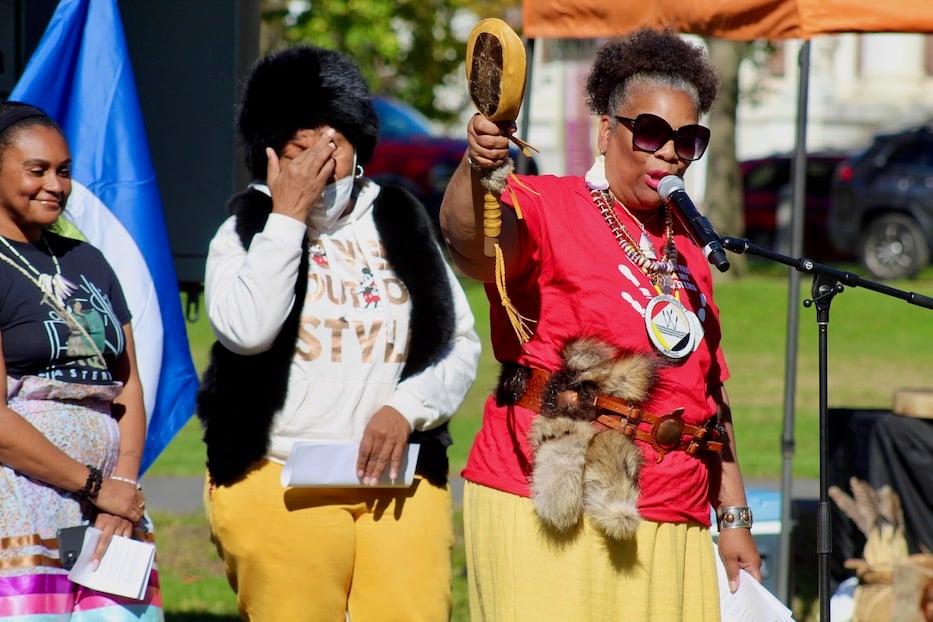
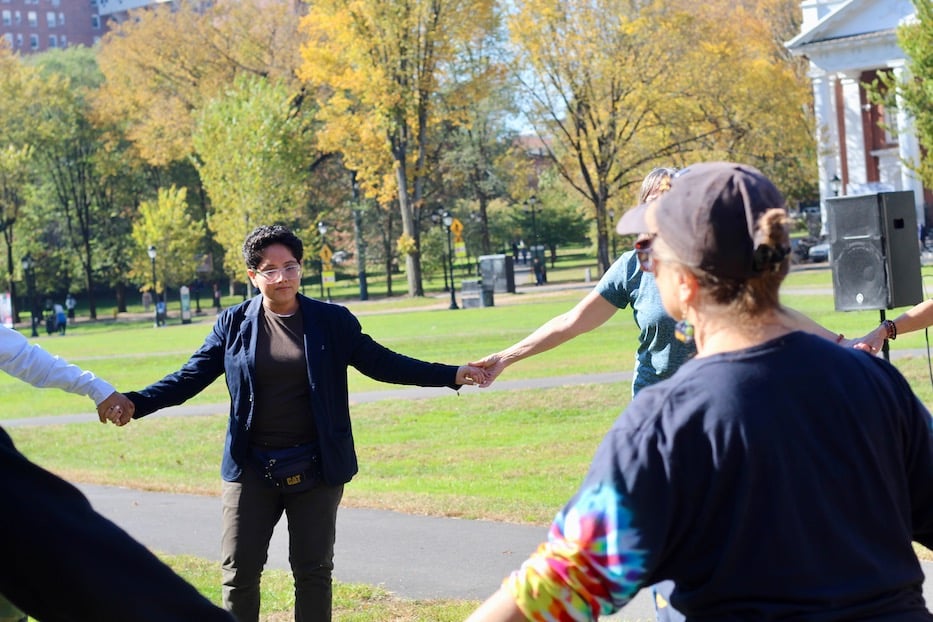
Top: Dr. Tamiko Jackson-McArthur, whose Native name is Caring Hands, with Jennifer Rawlings and Rene Shining Star McClain. Bottom: During the first of two round dances. As he spoke, Andre Strongbearheart Gaines, Jr. taught attendees about the origin of the round dance, which reflects the idea of the whole, for unstance the round earth or the round womb from which we all spring.
The Mohegan, she read. Niantic. She lifted a tortoise shell rattle and smiled. Nipmuc! “I’m always going to represent,” she added with a laugh. The Paugessets. Pequots. The Podunk. The Quinnipiac. Schaghticoke. The Tunxis. Wangunk. Mattabesett.
Behind her, Jennifer Rawlings and Rene Shining Star McClain waited quietly, adding their voices to the mix as Jackson-McArthur stepped back. Rawlings, who grew up in New Haven, acknowledged the Mashpee Wampanoag Tribe, the Aquinnah Wampanoag of what is now recognized as Martha’s Vineyard, the Herring Pond and Assonet Wampanoag, the Abenaki, Pawtucket, Pennacook, Nauset, Patuxet and Pokanoket.
Overhead, the sun continued to rise and heat the ground, as if it was listening. McClain, who is from the Wabbaquasset Nipmuc band, brought it home as she nodded to the Narragansett of Rhode Island, Wampanoag, Pokanoket, and Natick.
“We were first contact,” Jackson-McArthur said. “We were first assimilated. So we’re going to look a lot different than what the media’s gonna try to make you think. So when you tell us ‘Well, you might not be Indian’ …Don’t ever say that to someone who says, ‘I am Native.””
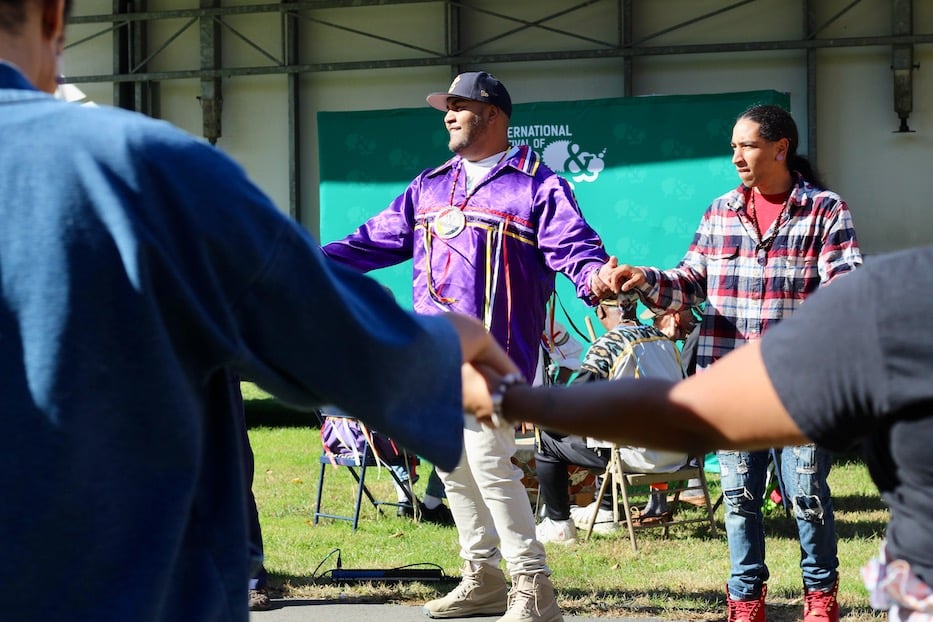
To one side, the Pomham Singers brought that message to life as they ushered in a round dance, inviting all attendees to join. As members of the Mashapaug Nahaganset Tribe, musicians began to sing steadily, the drum ringing out as Watson called out directions. Just yards away from them, Rawlings extended her arms, hands interlocking until a wide, sun-splattered circle had formed.
From across the grass, New Haven elder Elaine Peters made her way slowly towards the group, finding a space to enter with her walker. Her dog, a chihuahua named Coconut, padded patiently behind her as the circle began to move. She looked to her right and her left, watching as the whole slowed to accommodate her movements.
“In the middle and make some noise!” Watson cried out, and almost two dozen people moved in toward the center of the grass, voices raised towards the blue sky. Multiple times before and after, speakers commented on what a day the Creator had gifted them, even in a time of climate disaster and a rapidly warming earth.
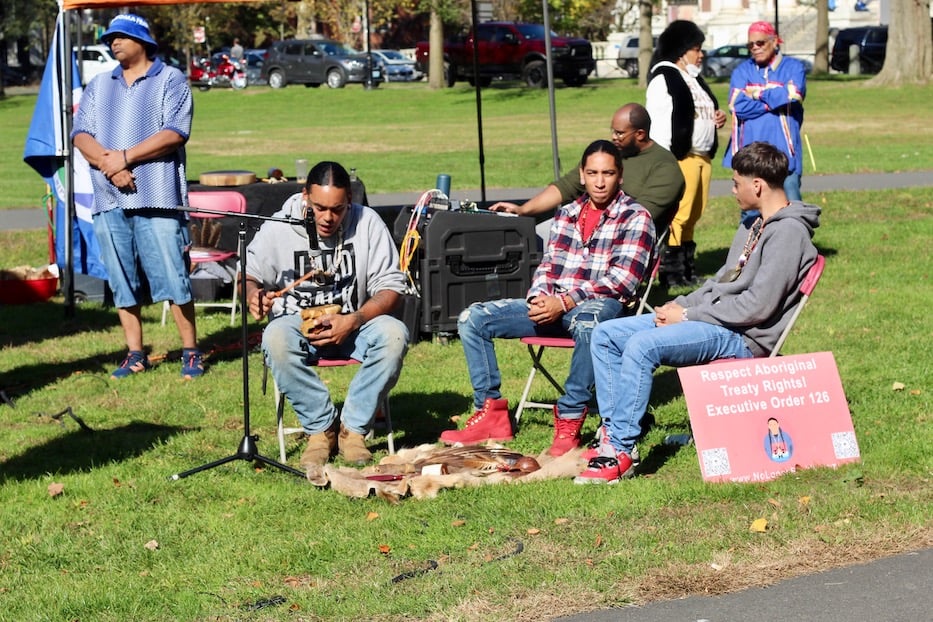
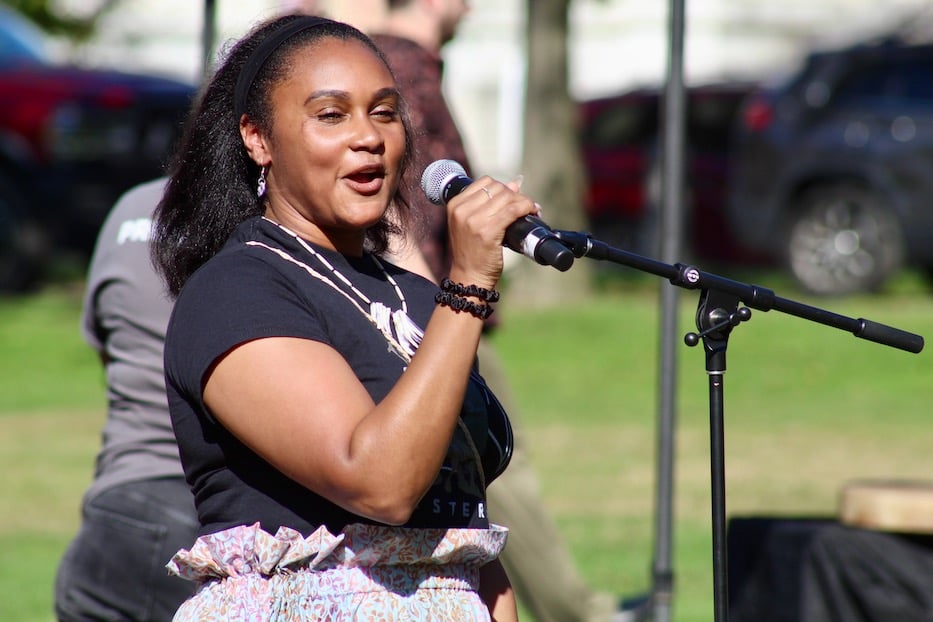
As they finished, attendees settling back on the grass, Gaines balanced the joy of that moment and of the day with the pain of Native history in the U.S., where white supremacy and colonialism have for centuries been used as a tool to violently divide and oppress people. Wrapping his left hand gently around the drum that had been in his lap, he began to play, his voice floating over the space. Across his sweatshirt, the words Land Back peeked out in black and gray.
“These songs, they are 10, 12,000 years old, as old as we are, as old as the earth is,” he said, looking up after he had finished. “I look around and I think about the weight that’s on the earth right now.”
“For 10, 12,000 years, we walked these lands in right reciprocity … I know that we needed to be here today, to be in solidarity with each other,” he said.
There is so much heavy history there, he added. Until the American Indian Religious Freedom Act of 1978, Native people risked punitive legal action and retaliation for speaking their language, growing out their hair, and holding on to the rites and rituals that had been passed down for generations. Decades later, the trauma of that history is still palpable and present.
“Don’t you think that assimilation did enough to us?” he asked aloud, to a few answers of Yes! and Mmmmm that bubbled up from 20 people who had settled on the grass.
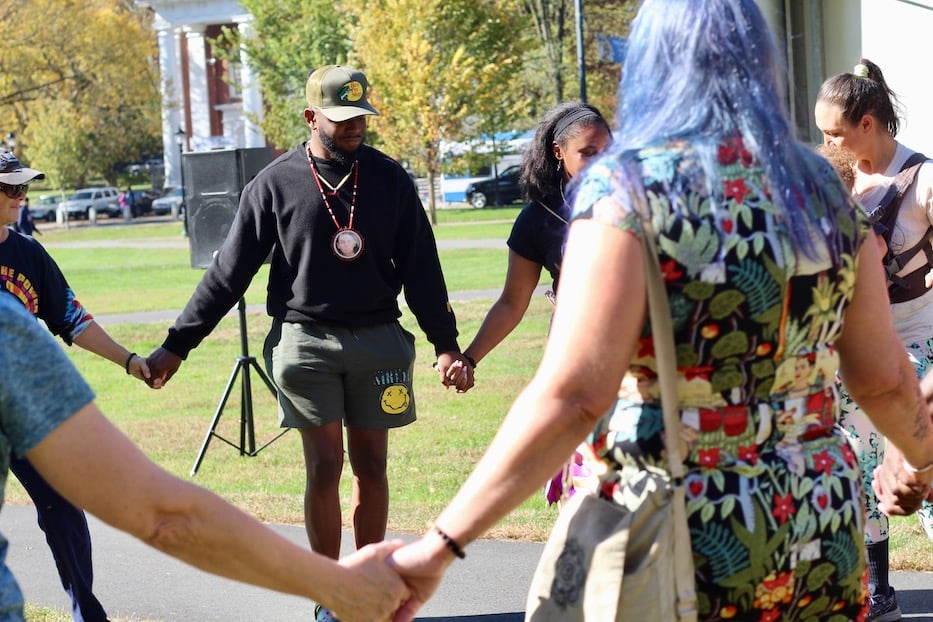
Telling the story of a single healthy cedar swamp that remains in his community, he encouraged attendees to learn about Massachusetts Executive Order 126, which is supposed to protect the rights and customs of Native people, but is not always respected by local governments or law enforcement. Gaines has lived that firsthand: he was harassed by local police in Natick, Mass. while harvesting cedar for a traditional wetu, or longhouse.
He also stressed the importance of the Land Back movement, which bucks colonial notions of land ownership for Indigenous sovereignty. “Do you understand why we need to be back on the land?” he asked, and again, a small chorus of voices answered him. In a three-week period that has seen the violent displacement and murder of families from Palestine, the words hung low in the air, echoing long after he had spoken them.
As Watson and Rawlings took the mic to speak on the Center for Indigenous Peoples Rights (CIPR), Alder Frank Douglass, who is Shinnecock, said he was deeply grateful for the space to honor and celebrate his history, and the history of so many who had come before and would come after.
Raised in New Haven, Douglass credited his mother, 94-year-old Harriet Coles Douglass, for always instilling in him a sense of pride in who he was and is. When his daughter Frankie was born, he saw it as his charge to pass that on to her. For decades, he’s made sure that the family attends Shinnecock pow wows each year, making the journey to and from Long Island for the events. For him, it’s part of what it means to keep his heritage alive.
Back at the mic, Jackson-McArthur prepared to close out the afternoon with a poem titled “Ally, Or Fetish?” At the drum, the Pomham Singers prepared to sprinkle the surface with tobacco, in an offering to the Creator. Her words soared over the space, carrying all the way to Church Street in one direction, and out toward Chapel Street in the other. As she read, she conjured both Audre Lorde’s “A Litany for Survival” and something entirely of her own creation.
Do you love me, or do you want to own me? she began.
Do you want to put me on your shelf?
Do you honor me, or do you want to wear me?
Do you observe me, or do you want to imitate me?
Do you hear me, or do you play with me?
Do you love me, or do you want to own me?
As she continued, she encouraged people to call their elected representatives, and ask questions including “Whose land do we live on?” “What’s the history?” and “How are you honoring them?” (in New Haven, Mayor Justin Elicker’s answer is still with an Italian American Heritage Day).
She reminded people not to celebrate Christopher Colombus, whose true history includes the mass genocide of the Taíno people, to challenge colonial narratives wherever possible, and to work with Native people, rather than to assume what their communities need.
“Always remember that Natives look like all of you,” she added. “They look like everyone. We don’t look like what’s on t.v., or what’s on the Disney cartoon. We don’t look like that. Get that out of your mind. Because when you do that, then you’ll be able to see us and appreciate where we are and what we’re doing, for our people and for you.”

